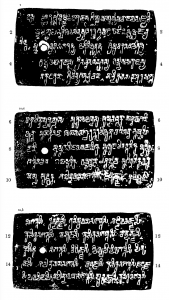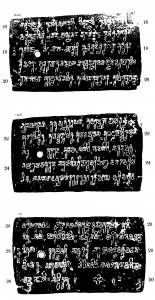

This charter records the donation of the village Ākāsapadda to fourteen Brāhmaṇas by Vindhyaśakti II. The charter records the names of the Brāmaṇas and the share of the village which they were given. According to Shastri 1997: 39, the charter is important in that it proves that Pravarasena I, who ruled as part of the undivided family, had at least four sons who all became kings, which until the discovery of this charter had not been satisfactorily proven.
Seen.
(Ll. 1 to 5). From Vatasagulma (Bâsim) by order of Vindhyaśakti, of the Vâkâṭakas, who is the righteous king, son of the righteous king Sarvasena, a gransdon of Śrî Pravarasena, son of Hârîti and also belonging to Viṣṇuvṛddha gotra, who is an emperor performing agniṣṭoma, âptoryâma, Vâjapeya, Jytiṣṭoma, Bṛhaspatisava, Sâdyaskra and four aśvamedhas.
In the northern region of Nândikaṭa (the present Nândeḍ in the Nizam’s state). (ll. 6 and 7.) bhâkâlakkhoppakâbbhâse âkâsapaṭṭesu (?)
Completed
Those who are in our retine, those who have been appointed by the order of the chief, the warriors under orders, noblemen touring by command, should be spoken to (warned) (ll. 7 to 9); by us now for our success and sor successful end, for extending our life and strenghth, for attainment od welfare and peace, and for benefit here and in the next world, in this holy place and in this cillage, half to the section of Atharvaṇa; (ll. 10 to 15) to Situjja of Bhâlandâyaṇa gotra, to Ruddajja of Kapinjala gotra, to Bhâttidevajja of Śrâviṣṭhâyaṇa gotra, to Desujja of Kausika gotra to Veṇhujja of Kausika gotra, to Vidhijja of Kausika gotra, to Pitujja of Paippalâdi gotra, to Cândajja of Bhâlandâyana gotra and to Jeṭṭhajja of Kausika gotra by two parts; (ll. 16 to 19) to Buddhajja of Bàlandâyaṇa-gotra, to Bhâṭṭilajja of Kausika gotra, to Sivajja of Kausika gotra and to Hariṇṇajja of Kausika gotra―to these Brahmans third part; to Revatijja of Kausika gotra the fourth part; lasting for the period of the sun and the moon, have been given as was not formely given, we give with the exemptions and limitations in the village which has people of the four Vedas―which exemptions and limitations were given effect to by the former kings.
The exemptions and limitations are as follows:―(ll. 20 to 23) without being required to supply bullocks, etc. in succession free from the dues of digging and selling salt, without any dues for gold, grain and matrimony, without requiring to pay dues for cows and bullocks as was being paid previously, avar, siddhika (?), without any dues for hide and coal, free from the entry of the warrioirs, without being required to supply cots, water pots, etc. free from any taxes, free from carriers taxes, with the underground treasure and with the minor treasures, with the right of duties and taxes (l. 24) samaṇca mahâkaraṇa sâvvajâti parihâra parihitanca (?) (ll. 24 and 25) protect and cause to be protected from those who disobey the order written aboce, defeat them and cause them to be defetec (ll. 26 to 28); we will restraint, with punishment, the person who obstructs or allows obstruction being caused by others―on being complained against them by the Brahmins mentiones above (ll. 28 to 30). It has been completed in the year 37, first fortnight of Hemanta, day 4. This order has been written by Viṣṇu, the general.
Let there be success.